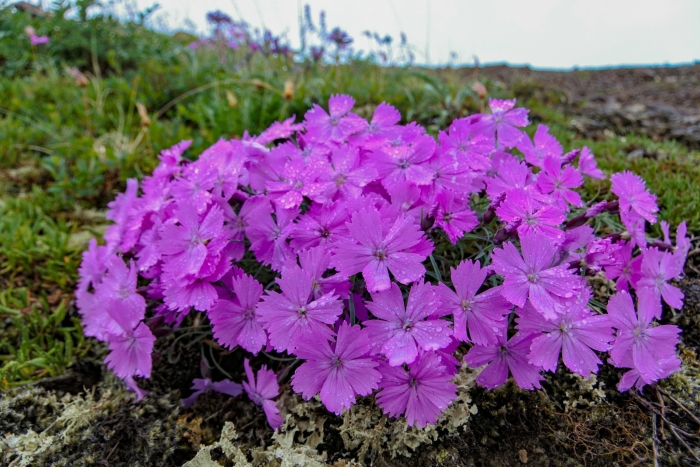Boreal Carnation
(Dianthus repens)
Boreal Carnation (Dianthus repens)
/
/

Лия
CC BY 4.0
Image By:
Лия
Recorded By:
Copyright:
CC BY 4.0
Copyright Notice:
Photo by: Лия | License Type: CC BY 4.0 | License URL: http://creativecommons.org/licenses/by/4.0/ | Rights Holder: Лия | Publisher: iNaturalist | Date Created: 2022-07-06T13:22:32-07:00 |

























Estimated Native Range
Summary
Dianthus repens, commonly known as boreal carnation or northern pink, is a perennial herb native to a variety of habitats including alpine and subalpine zones, rocky outcrops, and talus slopes in regions such as Inner Mongolia, Siberia, the Russian Far East, northern European Russia, Alaska, and the Yukon Territory. It typically forms dense clumps of slender, erect or mat-forming stems, reaching heights of 5-15 cm. The foliage is narrow and bluish-green, providing a delicate texture in garden settings. From late spring to early summer, Dianthus repens produces showy, solitary pink to purple flowers with fringed petals, each bloom arising from the axils of the leaves.
The boreal carnation is valued for its cold hardiness and its ability to thrive in challenging alpine environments, making it a suitable choice for rock gardens and border fronts in cooler climates. It is also appreciated for its fragrant flowers, which can add a sweet scent to the garden. In cultivation, Dianthus repens requires full sun to light shade and prefers well-drained, sandy or gravelly soils with neutral to slightly alkaline pH. It is relatively low maintenance but may need protection from excessive winter wetness. While generally disease-resistant, it can be susceptible to root rot in poorly drained conditions. This species is not known for aggressive roots or significant invasiveness issues, but it should be monitored to ensure it does not spread beyond its desired area in the garden.CC BY-SA 4.0
The boreal carnation is valued for its cold hardiness and its ability to thrive in challenging alpine environments, making it a suitable choice for rock gardens and border fronts in cooler climates. It is also appreciated for its fragrant flowers, which can add a sweet scent to the garden. In cultivation, Dianthus repens requires full sun to light shade and prefers well-drained, sandy or gravelly soils with neutral to slightly alkaline pH. It is relatively low maintenance but may need protection from excessive winter wetness. While generally disease-resistant, it can be susceptible to root rot in poorly drained conditions. This species is not known for aggressive roots or significant invasiveness issues, but it should be monitored to ensure it does not spread beyond its desired area in the garden.CC BY-SA 4.0
Plant Description
- Plant Type: Herb
- Height: 0.5-1 feet
- Width: 0.5-1 feet
- Growth Rate: Moderate
- Flower Color: Pink, Purple
- Flowering Season: Summer
- Leaf Retention: Evergreen
Growth Requirements
- Sun: Full Sun
- Water: Medium, High
- Drainage: Fast
Common Uses
Border Plant, Butterfly Garden, Groundcover, Low Maintenance, Rock Garden
Natural Habitat
Alpine and subalpine zones, rocky outcrops, and talus slopes
Other Names
Common Names: Pink Sand, Cu Jing Shi Zhu, Northern Pink, 장백패랭이꽃, Alpine Pink
Scientific Names: , Dianthus repens, Dianthus repens var. repens,
GBIF Accepted Name: